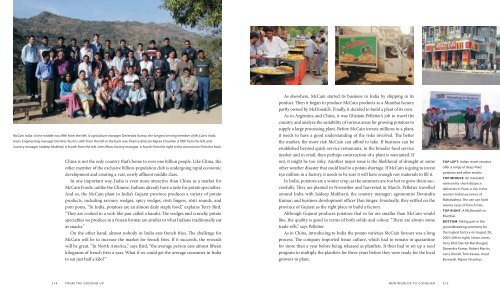From the Ground Up - McCain Foods Limited
From the Ground Up - McCain Foods Limited
From the Ground Up - McCain Foods Limited
Create successful ePaper yourself
Turn your PDF publications into a flip-book with our unique Google optimized e-Paper software.
<strong>McCain</strong> India: In <strong>the</strong> middle row, fifth from <strong>the</strong> left, is agriculture manager Devendra Kumar, <strong>the</strong> longest serving member of <strong>McCain</strong>’s India<br />
team. Engineering manager Dominic Rush is sixth from <strong>the</strong> left in <strong>the</strong> back row, finance director Rajeev Chauhan is fifth from <strong>the</strong> left, and<br />
country manager Jaideep Mukherji is fourth from <strong>the</strong> left. John Allan, factory manager, is fourth from <strong>the</strong> right in <strong>the</strong> second row from <strong>the</strong> back.<br />
China is not <strong>the</strong> only country that’s home to over one billion people. Like China, <strong>the</strong><br />
o<strong>the</strong>r member of <strong>the</strong> exclusive billion-population club is undergoing rapid economic<br />
development and creating a vast, newly affluent middle class.<br />
In one important way, India is even more attractive than China as a market for<br />
<strong>McCain</strong> <strong>Foods</strong>: unlike <strong>the</strong> Chinese, Indians already have a taste for potato specialties.<br />
And so, <strong>the</strong> <strong>McCain</strong> plant in India’s Gujarat province produces a variety of potato<br />
products, including savoury wedges, spicy wedges, rösti fingers, rösti rounds, and<br />
pom poms. “In India, potatoes are an almost daily staple food,” explains Terry Bird.<br />
“They are cooked in a wok-like pan called a karahi. The wedges and crunchy potato<br />
specialties we produce in a frozen format are similar to what Indians traditionally eat<br />
as snacks.”<br />
On <strong>the</strong> o<strong>the</strong>r hand, almost nobody in India eats french fries. The challenge for<br />
<strong>McCain</strong> will be to increase <strong>the</strong> market for french fries. If it succeeds, <strong>the</strong> rewards<br />
will be great. “In North America,” says Bird, “<strong>the</strong> average person eats almost fifteen<br />
kilograms of french fries a year. What if we could get <strong>the</strong> average consumer in India<br />
to eat just half a kilo?”<br />
As elsewhere, <strong>McCain</strong> started its business in India by shipping in its<br />
product. Then it began to produce <strong>McCain</strong> products at a Mumbai factory<br />
partly owned by McDonald’s. Finally, it decided to build a plant of its own.<br />
As in Argentina and China, it was Ghislain Pelletier’s job to travel <strong>the</strong><br />
country and analyze <strong>the</strong> suitability of various areas for growing potatoes to<br />
supply a large processing plant. Before <strong>McCain</strong> invests millions in a plant,<br />
it needs to have a good understanding of <strong>the</strong> risks involved. The better<br />
<strong>the</strong> market, <strong>the</strong> more risk <strong>McCain</strong> can afford to take. If business can be<br />
established beyond quick-service restaurants, in <strong>the</strong> broader food service<br />
market and in retail, <strong>the</strong>n perhaps construction of a plant is warranted. If<br />
not, it might be too risky. Ano<strong>the</strong>r major issue is <strong>the</strong> likelihood of drought or some<br />
o<strong>the</strong>r wea<strong>the</strong>r disaster that could lead to a potato shortage. If <strong>McCain</strong> is going to invest<br />
$50 million in a factory, it needs to be sure it will have enough raw materials to fill it.<br />
In India, potatoes are a winter crop, as <strong>the</strong> summers are too hot to grow <strong>the</strong>m successfully.<br />
They are planted in November and harvested in March. Pelletier travelled<br />
around India with Jaideep Mukherji, <strong>the</strong> country manager; agronomist Devandra<br />
Kumar; and business development officer Dan Singer. Eventually, <strong>the</strong>y settled on <strong>the</strong><br />
province of Gujarat as <strong>the</strong> right place to build a factory.<br />
Although Gujarat produces potatoes that so far are smaller than <strong>McCain</strong> would<br />
like, <strong>the</strong> quality is good in terms of both solids and colour. “There are always some<br />
trade-offs,” says Pelletier.<br />
As in China, introducing to India <strong>the</strong> potato varieties <strong>McCain</strong> favours was a long<br />
process. The company imported tissue culture, which had to remain in quarantine<br />
for more than a year before being released as plantlets. It <strong>the</strong>n had to set up a seed<br />
program to multiply <strong>the</strong> plantlets for three years before <strong>the</strong>y were ready for <strong>the</strong> local<br />
growers to plant.<br />
214 <strong>From</strong> <strong>the</strong> GrouN d up<br />
New w orlds to CoN quer 215<br />
tOP lEFt: Indian street vendors<br />
offer a range of deep-fried<br />
potatoes and o<strong>the</strong>r snacks.<br />
tOP MIddlE: An insulated<br />
minivan for short-distance<br />
deliveries in Pune, a city in <strong>the</strong><br />
western Indian province of<br />
Maharashtra. The van can hold<br />
twenty cases of french fries.<br />
tOP RIGHt: A McDonald’s in<br />
Mumbai.<br />
BOttOM: Taking part in <strong>the</strong><br />
groundbreaking ceremony for<br />
<strong>the</strong> Gujarat factory on August 28,<br />
2005: (left to right) Simon Jones,<br />
Terry Bird, Derrick MacDougall,<br />
Devendra Kumar, Robert Martin,<br />
Larry Derrah, Tom Kaszas, Lloyd<br />
Borowski, Rajeev Chauhan.






